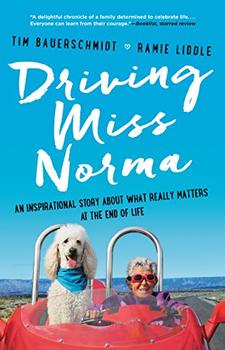Summary | Excerpt | Reading Guide | Reviews | Beyond the book | Read-Alikes | Genres & Themes | Author Bio

From the author of the best-selling and beloved The End of Your Life Book Club - a wonderfully engaging new book: both a celebration of reading in general and an impassioned recommendation of specific books that can help guide us through our daily lives.
"I've always believed that everything you need to know you can find in a book," writes Will Schwalbe in his introduction to this thought-provoking, heartfelt, and inspiring new book about books.
In each chapter he makes clear the ways in which a particular book has helped to shape how he leads his own life and the ways in which it might help to shape ours. He talks about what brought him to each book - or vice versa; the people in his life he associates each book with; how each has led him to other books; how each is part of his understanding of himself in the world. And he relates each book to a question of our daily lives, for example: Melville's Bartleby, the Scrivener speaks to quitting; 1984 to disconnecting from our electronics; James Baldwin's Giovanni's Room to the power of finding ourselves and connecting with one another; Anne Morrow Lindbergh's Gift from the Sea to taking time to recharge; Anne Lamott's Bird by Bird to being sensitive to the surrounding world; The Little Prince to making friends; Paula Hawkins's The Girl on the Train to trusting.
Here, too, are books by Dickens, Daphne du Maurier, Haruki Murakami, Edna Lewis, E. B. White, and Hanya Yanagihara, among many others. A treasure of a book for everyone who loves books, loves reading, and loves to hear the answer to the question: "What are you reading?"
Books for Living isn’t as emotional or consuming as The End of Your Life Book Club, but few books are. What we have, instead, is a book asking us to think – yes, to think about what we are reading – but more specific than that, begging us to think about how what we are reading can make us better people and lead richer lives. And that’s something to celebrate...continued
Full Review
(673 words)
This review is available to non-members for a limited time. For full access,
become a member today.
(Reviewed by Bradley Sides).
Empathy seemed to take a huge hit in 2016. I can't think of many weeks that went by where blatant hate or some form of intolerance wasn't at the forefront of the news. I got to a point where I decided to disconnect from media. I couldn't take it anymore.
When Will Schwalbe's Books for Living arrived on my doorstep, it couldn't have come at a better time. I opened the cover and was taken away to a happier and more thoughtful world – the one of books. I was smiling before I could finish the introduction. In each chapter, Schwalbe picks one book and talks about the one value he most draws from it. Among other things, he writes about the value of hugging when discussing Hanya Yanagihara's A Little Life, the...
This "beyond the book" feature is available to non-members for a limited time. Join today for full access.

If you liked Books for Living, try these:

by Tim Bauerschmidt, Ramie Liddle
Published 2018
Infused with this irrepressible nonagenarian's wisdom, courage, and generous spirit, and filled with sixteen pages of color photographs, Driving Miss Norma reminds us that life is beautiful and precious, and that family, fun, and self-discovery can happen at any age.

by Elizabeth D. Samet
Published 2008
What does literature - particularly the literature of war - mean to a student who is likely to encounter its reality? What is the best way to stir uninhibited classroom discussions in a setting that is designed to train students to follow orders, respect authority, and survive grueling physical and mental experiences? This is the terrain Samet ...
There is no such thing as a moral or immoral book. Books are either well written or badly written. That is all.
Click Here to find out who said this, as well as discovering other famous literary quotes!